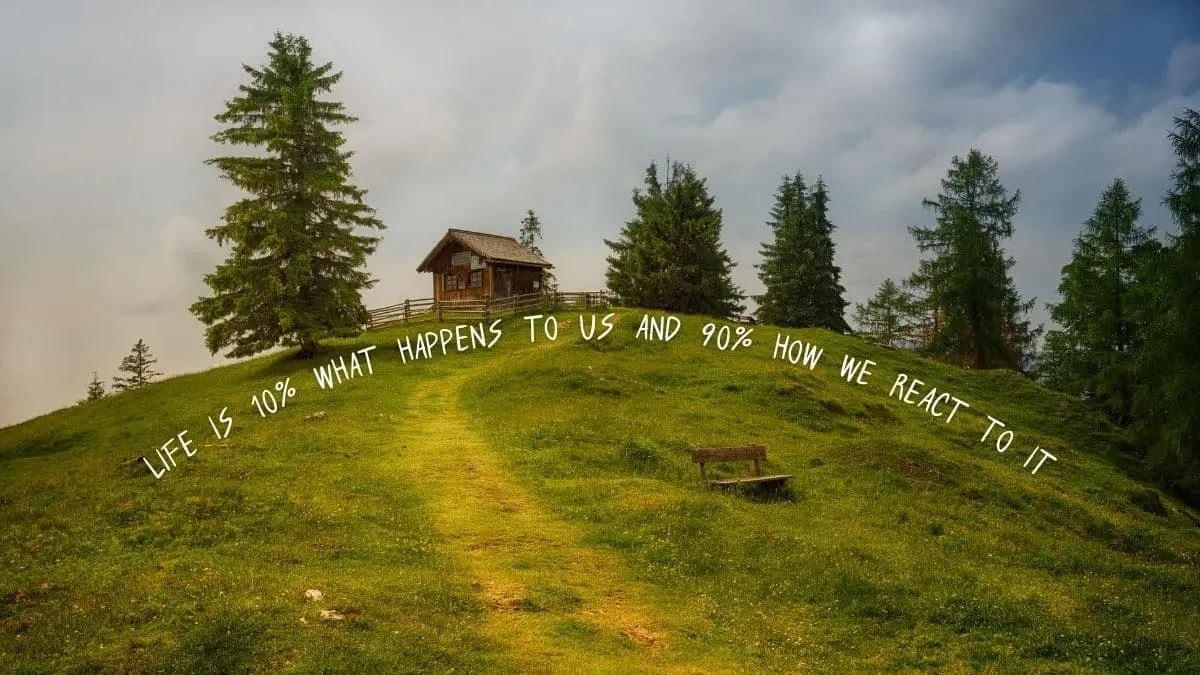- The first part of the quote acknowledges that external events do play a role in our lives.
- Our interpretation of events, more than the events themselves, shapes our experiences.
- The quote implies that while we can’t control everything that happens to us, we do have control over how we respon…
- While the event (10%) was a life-threatening tragedy, Malala’s reaction (90%) was one of extraordinary courage and…
- Athletes often face career-threatening injuries, a clear example of the 10% of life that happens to them.
- Life is the moment we are living now
At first glance, the quote “Life is 10% what happens to us and 90% how we react to it” seems like a simple truism, yet it carries a weight that is both inspirational and challenging. It suggests that while we cannot always control the events that unfold around us, we have significant agency in how we respond to these events. This perspective shifts the focus from external circumstances to internal choices, emphasizing personal responsibility and the strength of the human spirit.
In an increasingly complex and unpredictable world, where individuals often feel at the mercy of external forces, this quote offers a beacon of empowerment. It resonates with those who seek to find strength within themselves, encouraging a proactive stance towards life’s challenges. By asserting that a major part of our life’s outcome is determined not just by what happens to us, but more importantly, by how we choose to respond, it invites a deeper examination of our attitudes, beliefs, and actions.
Understanding the Quote
“Life is 10% what happens to us and 90% how we react to it” is a statement that speaks volumes about the human condition and our capacity to shape our reality. To fully grasp its meaning, it’s essential to dissect both components of the quote – the role of external events and the power of our reactions.
The Role of External Events (10%)
The first part of the quote acknowledges that external events do play a role in our lives. These events can be anything from personal tragedies, unexpected opportunities, to everyday occurrences. This 10% represents the uncontrollable, often unpredictable, aspects of life that we all encounter. It’s a recognition of the fact that life can be random and chaotic, and sometimes things happen that are outside our influence.
The Power of Our Reactions (90%)
The crux of the quote lies in the second part, which claims that 90% of life is determined by how we react to what happens to us. This is where the concept of personal agency and choice comes into play. It suggests that the impact of any event on our lives is largely dependent on our reaction to it. Our attitudes, perceptions, and the meanings we assign to events are pivotal.
Interpretation and Perception
Our interpretation of events, more than the events themselves, shapes our experiences. Two people can experience the same situation but may interpret and react to it differently, leading to diverse outcomes. This part of the quote encourages a mindset where we focus on our internal responses rather than external circumstances.
Choice and Control
The quote implies that while we can’t control everything that happens to us, we do have control over how we respond. This control is not about denying or suppressing emotions but about making conscious choices in our responses. It’s about acknowledging our emotions and then deciding the best course of action.
Resilience and Growth
This perspective fosters resilience. By focusing on our reactions, we can find ways to grow and learn from our experiences, even the challenging ones. It’s a call to not be passive recipients of life’s whims but active participants who can extract wisdom and strength from whatever life throws our way.

Real-life Examples and Case Studies
The principle that “Life is 10% what happens to us and 90% how we react to it” finds its most compelling evidence in real-life examples and case studies. These stories not only illustrate the quote’s truth but also inspire and guide others in applying it to their own lives.
Example 1: Overcoming Personal Tragedy
Consider the story of Malala Yousafzai, the Pakistani activist for female education who survived a gunshot wound from a Taliban gunman. While the event (10%) was a life-threatening tragedy, Malala’s reaction (90%) was one of extraordinary courage and determination. Instead of succumbing to fear or bitterness, she used her experience as a catalyst to become a global advocate for education. Her response not only transformed her life but also had a profound impact on the world, demonstrating how a resilient reaction to adversity can lead to positive change.
Case Study: Business Adaptation in Crisis
The COVID-19 pandemic serves as a case study in how businesses react to external crises. While all businesses were affected by the pandemic (10%), their responses (90%) varied significantly. Some companies, like Zoom and other tech firms, quickly adapted their business models, leveraging the surge in remote work and digital communication. Others, unable to pivot or respond effectively, struggled or ceased operations. This case study underscores the impact of reactive strategies in determining outcomes in challenging situations.
Example 2: Athletes Overcoming Injury
Athletes often face career-threatening injuries, a clear example of the 10% of life that happens to them. However, the stories of athletes like Serena Williams or Tiger Woods, who overcame severe injuries through rehabilitation, mental resilience, and a positive attitude, emphasize the 90% of how they reacted. Their journeys from injury to returning to top performance levels are testimonials to the power of a positive and determined reaction in the face of adversity.
Case Study: Natural Disaster Resilience
The response of communities to natural disasters like earthquakes, hurricanes, or floods offers another perspective. While the disaster itself is beyond control, the resilience and solidarity of the affected communities in rebuilding and supporting each other highlight the power of collective reaction. Studies show that communities with strong social ties and effective leadership often recover more quickly, illustrating how reaction significantly influences the aftermath of uncontrollable events.
Conclusion
This quote “Life is 10% what happens to us and 90% how we react to it” is not just an observation but a call to action. It challenges us to examine our attitudes, to reassess our perceptions, and to recognize that while we cannot control every aspect of our lives, we hold significant power in shaping our experiences through our reactions. Whether it is in personal tragedies, professional setbacks, or global crises, the way we respond to circumstances can transform our lives and the lives of those around us.
Also Read: If you can concentrate always on the present, you’ll be a happy man. Life is the moment we are living now



